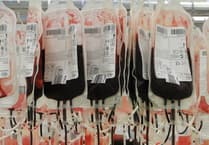A man originally from Brecon with brain cancer whose symptoms went undiagnosed for years is training to run the TCS London Marathon just months after finishing chemotherapy.
Edward Lewis, a civil engineer originally from Brecon, who now lives in Bishop’s Stortford, Hertfordshire, will be taking part in the iconic 26.2-mile race on Sunday, April 21 in aid of Brain Tumour Research.
He will be joined by his sister Emma Eynon, from Carmarthenshire, West Wales, and brother, Chris Lewis, from Notting Hill, West London, who will also be running for the charity.

Edward said: “Running the marathon is something I’ve always wanted to do. I’ve entered the ballot in the past but have never been lucky enough to secure a place. Then, whilst I was in the latter stages of chemo, my wife saw a post on social media about applying for a charity place and I decided to reach out to Brain Tumour Research.
“When I mentioned it to my sister, she said she wanted to do it with me and very quickly we went from two to three, with my brother also signing up.”
The siblings’ support of the charity comes after Edward was diagnosed with a grade 3 oligodendroglioma following a seizure in June 2022.
Having been treated for anxiety and depression for three years prior, the discovery of a 6cm wide tumour in the middle of his brain came as a “complete shock” to Edward and his family.
The 36-year-old, who has since undergone surgery, radiotherapy and chemotherapy, said: “Whether at work, home or in a social setting, there were times I just wouldn’t be able to speak. I was being treated for anxiety and depression and was told I was experiencing a form of panic attack.
“I do have a high-pressured job and, with the narrative around mental health, I found myself going along with it. In hindsight, I should have done more, but having a brain tumour is the last thing you expect.
“I was put on medication, which did absolutely nothing but I was told it would take a long time to see results. We had upped the dosage and I was having talking therapy, but nothing was working. Thankfully, those episodes have completely stopped since I had surgery.”
Edward’s tumour is now stable and being monitored with three-monthly scans.
The father-of-two, whose fundraising has already exceeded £10,000, said: “I went to the marathon to support a couple of people I knew about 10 years ago and the atmosphere was amazing. I remember thinking then how great it would be to run it one day and now I can’t wait.
“My last round of chemo was in June 2023 and running then was difficult but I feel quite normal at the moment. I’m currently up to three times a week but I’m obviously going to step that up in the New Year. From 1 January, it’s going to be four runs, two days of strength and conditioning and a rest day each week."
He added: “It’s frightening how common brain tumours are and shocking how massively underfunded research into the disease is. It’s a difficult part of the body to treat and the lack of investment in research is really quite frustrating when you consider what treatments are available for other forms of cancer.
“I consider myself to be really fortunate compared to a lot of other people and I think it’s right, first and foremost, to do what I can to help fund research and support a legacy of, hopefully, finding a cure for this disease in the future.”
Carol Robertson, national events manager for Brain Tumour Research, said: “We’re really pleased to hear how well Edward is doing. Sadly, with one in three people knowing someone affected by a brain tumour, his story is not unique. Brain tumours kill more children and adults under the age of 40 than any other cancer, yet just 1 per cent of the national spend on cancer research has been allocated to this devastating disease since records began in 2002.
“We’re determined to change this but we can’t do it alone. We’re really grateful to Edward, Chris and Emma for all their support. We wish them well with their training and look forward to cheering them across the finish line in April.”
Brain Tumour Research funds sustainable research at dedicated centres in the UK. It also campaigns for the Government and larger cancer charities to invest more in research into brain tumours in order to speed up new treatments for patients and, ultimately, to find a cure. The charity is the driving force behind the call for a national annual spend of £35 million in order to improve survival rates and patient outcomes in line with other cancers such as breast cancer and leukaemia.
To support Edward’s fundraising, visit www.justgiving.com/fundraising/Ed-Lewis2024.





Comments
This article has no comments yet. Be the first to leave a comment.